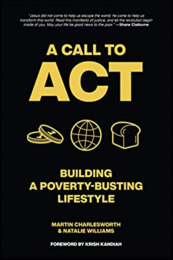 A Call to Act is about living a Poverty-Busting Lifestyle and has just been released by Jubilee+ (published by David C Cook) with strong endorsements by many well-known names including Shane Claiborne, Terry Virgo, Bishop Philip North, Gavin Calver of the Evangelical Alliance, and Member of Parliament Stephen Timms, and a forward by Krish Kandiah (Home for Good).
A Call to Act is about living a Poverty-Busting Lifestyle and has just been released by Jubilee+ (published by David C Cook) with strong endorsements by many well-known names including Shane Claiborne, Terry Virgo, Bishop Philip North, Gavin Calver of the Evangelical Alliance, and Member of Parliament Stephen Timms, and a forward by Krish Kandiah (Home for Good).
A Call to Act is both an easy read and a hard read. Easy because it is very accessibly written with clear Biblical reasoning that is not ‘heavy’ and full of stories that draw you into the book. Hard because there are serious implications if you are going to apply what Martin Charlesworth and Natalie Williams have written to your own circumstances.
Martin and Natalie are peculiarly well qualified to joint-author this book; it is no theory for them as they both live out the principles addressed. Martin, from a relatively privileged background, determined 16 years ago with his wife Sue that they should simplify their lifestyle in terms of possessions, becoming eco-friendly with their energy supplies and so on. Natalie was brought up in significant poverty and is refreshingly self-mocking about some of the ways in which she used to behave and how she has responded to the impact of Christ on her life.
Considering the chapters:
- The abrupt call to act of the Coronavirus Pandemic. The original manuscript was completed pre-covid and was relevant even at that time. Now, in the covid era, it is doubly relevant and calls for an appropriate response as it is always those who are poorest who feel the greatest impact of such a world-impacting crisis.
- Context and Calling. Here Martin gives a historical and Biblical perspective for the call to act contrasting lifestyles now with those from previous ages. The challenge the reader faces is: Am I prepared to reconsider my own lifestyle in the midst of a consumerist culture? This is part of Christian discipleship.
- A life of Simplicity. Why do we buy and collect? Simplicity of lifestyle bases the standard of living on genuinely what we need to live on not on what we want. The latter results in ownership of many things you rarely, if ever, use. There is no need for the Christian to collect stuff to prove your status; that is the world’s approach. A simpler lifestyle also releases cash for helping others.
- Poverty busting inclusivity. Drawing on her own history and many stories Natalie opens up the topic of how the church can respond to be inclusive to those who may not be ‘attractive’ to the outer eye but whom Jesus would have always drawn alongside. Are we prepared to have our attitudes and prejudices challenged?
- Changing your community. Churches are called to be the agents of change. But this can be inconvenient and costly. This chapter gives good examples of what has worked. It points to an action plan of how to approach building a poverty-busting community
- Buying for justice. We all tend to buy without thinking about those who may have been forced to make the item of clothing, or whatever it happens to be. We are detached from those who make our goods. Ethical buying may require some thought and effort to discover these hidden truths. For instance, we need to consider issues of modern day slavery. We also need to ask what God thinks about exploitation of the poor.
- Care for creation. Somehow the world can seem so big that we may be tempted to ask what difference my decision can make to global issues. But God requires us to be good stewards of the earth He created. We have a mandate from God to look after creation. In this final chapter Martin gives steps of what we can do from his own experience.
Each chapter concludes with study questions which are suitable for discussion starters in church small groups. Short videos to complement these are also available free on https://acalltoact.co.uk/
I strongly recommend this book. I believe it can have far-reaching and greatly beneficial consequences. It is currently available at discount here.
